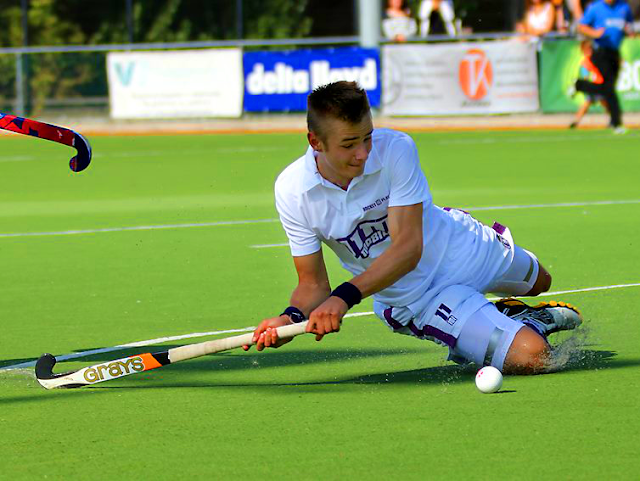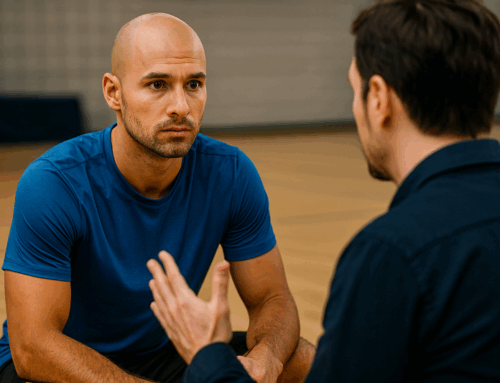Mental Preparation and Coaching in Hockey
This article was written by Manuel Dupuis, a sports psychologist who has been working as a mental trainer since 2003, especially in football, hockey, and basketball. This article is the result of his personal experience and is not exhaustive.
This article focuses on the individual aspects that he often works on in mental preparation for hockey. A second article on collective aspects in hockey is available here: Mental Preparation in Hockey: Collective Aspects.
The Mental Aspect in Hockey: Individual Aspects
I will first present some examples of mental skills and situations that I most commonly encounter in my practice with players, along with examples of techniques. I will limit myself to a few common requests and situations.
Concentration/Mental Drifting
Concentration, or sustained attention throughout the match and during different training sessions, is frequently trained with players. Hockey matches are very intense, with little downtime, and everything happens rapidly. It’s crucial to remain focused from moment to moment, to be ready to perform when entering the game, and to stay calm and focused in moments of frustration or after conceding a goal.
In such situations, some players have developed the ability to remain composed and concentrate on the game ahead, while others find themselves lost in thoughts that take them away from the reality of the match. Sometimes, this comes at a cost.
The work involves, therefore, training or reinforcing a ritual with the player to initially calm down (if necessary) and then regain focus.
Besides concentration, combativeness might also diminish. In such cases, it’s essential to reactivate it.
Mental drifting techniques are suggested and practiced to shift to an emotionally “neutral” state (calm), or even “positive” (here, focused, but it can also mean, depending on the player’s needs, combativeness or confidence). The term “drifting” alludes to the reflex of changing TV channels when not enjoying what’s being watched.
Here are 3 steps to “drift” during a moment of distraction:
- Learn to become aware of being distracted.
This is crucial as some players realize only later that they’ve drifted from the game (for example, they are busy complaining, or still stuck in the previous play phase).
This isn’t so straightforward. Some players know what to do (they possess the technique), but they operate during the match so automatically that they temporarily don’t realize their state. It’s important to put into practice certain training methods used in mental preparation, like methods for focusing attention and mindfulness or certain sophrology exercises. - Return to a more neutral emotional state, for example through breathing, a ritual, or a resource image.
- Re-focus and trigger action towards the game, using a personal trigger: a word or phrase they repeat, or a significant gesture (e.g., gripping the stick). As explained below, this step is often the simplest; the trickiest part is phase 1.
Resource anchoring is an interesting tool here to activate not only concentration but also other mental states, such as confidence or combativeness. The principle here is to create an association in memory between a trigger and a mental state.
You can find a comprehensive article on this technique in the following link: “Resource Anchoring“.
Stress and Pressure Management/Optimal Performance in Hockey
Pre-game stress, or stress during critical moments, is naturally a topic often discussed among players.
Nevertheless, it seems that this is generally well managed in hockey, compared to other sports, like football, for various reasons we won’t delve into here.
Stress before a match, or in crucial moments, is normal: it readies the body to act and should be accompanied by positive thoughts (e.g., “I use my stress to give my all on the field”). Therefore, it’s important to develop a positive internal dialogue (“self-talk”), meaning phrases or words that motivate us.
Note that stress shouldn’t be too high. There exists an optimal performance zone known as “flow”, characterized, among other things, by a personally fitting activation level, combined with a high level of confidence and concentration.
In hockey, stress is also generated by the result-oriented pressure from the surroundings (parents, club staff, etc.), as well as by the desire to succeed at a high level.
Youth players in national teams aren’t yet fully equipped in terms of mental aptitudes and are less resistant to result-related pressure. Learning different techniques, such as relaxation, meditation, or sophrology, is quite appreciated and effective in this context. Sometimes, more in-depth individual work is necessary.
Other articles related to these themes:
- article on stress management in competitive sports
- article on flow in sports
Self-Confidence and Positive Attitude in Hockey
The willingness to take initiative and some risks is clearly identified by nearly 100% of players I work with as an important performance factor. Confidence in success is generally positive when rationally reflected upon: players are aware of their capabilities and know that if they dare, they can perform.
Nevertheless, during the match, some automatism take hold, sometimes positive (e.g., persisting even after conceding a goal) and sometimes negative (getting discouraged after an error).
While in the past, the mentally strongest made the difference, behavior modification techniques, particularly through mental imagery or behavioral techniques, offer interesting potential for progression for players with high potential but initially weaker mental resilience.
Positive attitude, especially in terms of body language, or behaviors with a positive impact on the player and/or the team, are also frequently trained through behavioral techniques or visualization. This training promotes building confidence and taking initiatives on the field.
Starts of Matches in Hockey and Entries onto the Field
These moments are worked on because they are crucial for immediately engaging in the game, both physically and mentally.
Regulating the level of physiological activation, rituals, and brief mental imagery just before entering the field are used with the players.
Physical and Mental Recovery
It’s important for players to optimize their moments of physical and mental recovery.
A sufficient amount of sleep and a proper diet are essential.
The role of a mental trainer here is to make players aware of certain shortcomings and motivate them to change.
Time spent on social media and online games is often an issue among young players, and learning moments of rest requires adjustments in their lifestyle habits.
Continuation of the article > Mental Preparation in Hockey: Collective Aspects




